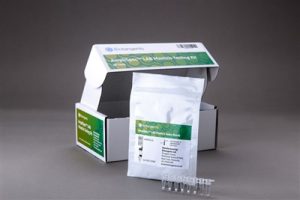Dxcover Limited, a diagnostics company developing spectroscopic liquid biopsy technology for early detection of multiple cancers, today announced the launch of the Dxcover® Infrared Platform, a ground-breaking platform that transforms Attenuated Total Reflectance Fourier Transform Infrared (ATR-FTIR) spectroscopy to enable faster sample analysis. Dr. Matthew Baker, co-founder and Chief Technology Officer, will be presenting an overview of the technology at the 12th International Conference on Clinical Spectroscopy (SPEC) in Dublin, Ireland.
ATR-FTIR spectroscopy is a powerful analytical technique without the need for extensive sample preparation or use of reagents. The traditional ATR method is reliant upon an internal reflection element (IRE), which is often a fixed point of analysis that requires mandatory cleaning steps to avoid cross contamination.
The Dxcover Infrared Platform however is composed of novel hardware items that transform commercial FTIR instruments. Dxcover sample slides are made from microfabricated silicon wafers and replace the single IRE with four sampling areas for one background measurement, and three sample measurements. Additionally, the Dxcover Autosampler can automate sample slide analysis, indexing the slide across the infrared beam without user interaction. Alongside efficiencies in batch processing, the Dxcover approach can be four times faster than standard ATR-FTIR instrumentation, which is optimized for clinical applications.
“Our team is excited to unveil our platform’s unique and innovative hardware at SPEC,” said Dr. Baker. “This milestone marks a significant step forward in transforming the use of infrared spectroscopy for a whole host of applications including detecting cancer at an earlier stage, which maximizes the opportunity to combat or control disease progression.”
Abstracts being presented at SPEC include:
· Clinical validation of a spectroscopic liquid biopsy for early detection of brain cancer
· Investigating the effect of inherit protein markers for a spectroscopic liquid biopsy platform
· Multi-cancer early detection with a spectroscopic liquid biopsy platform
· Machine learning based detection of pancreatic tumors using the Dxcover® cancer liquid biopsy
· Recurrent Neural Networks for Time Domain Interferogram Modelling
· Spinning Out Spectroscopy: Developing the Dxcover® Cancer Liquid Biopsy





